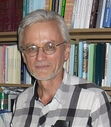Alexander J. Motyl's Blog, page 6
December 10, 2015
Russian Expansionism, Compatriots, and Energy Transformation

The following is an interview with Agnia Grigas, an expert on energy and political risk in Russia, Eastern Europe, and the post-Soviet region.
* * *
MOTYL: Your forthcoming book, Beyond Crimea: The New Russian Empire, argues that Moscow’s expansionist policies are driven by a desire to in-gather Russian and Russian-speaking “compatriots” in the non-Russian states. How does this process work?
GRIGAS: This is an effort to use compatriots—the ethnic Russians and Russian speakers residing in post-Soviet space—to regain influence and territory in foreign states. Since the 1990s, and particularly since the 2000s, Russia has passed some 20 laws, policies, and acts calling for compatriot engagement and protection. My book traces how Moscow uses Russian compatriots from the Baltic states to Central Asia in a seven-stage re-imperialization trajectory involving (1) Russian soft power, (2) humanitarian efforts, (3) compatriot policies, and (4) the distribution of Russian passports to compatriots abroad. As (5) information warfare intensifies over the alleged maltreatment and suffering of the Russian compatriots, (6) Moscow calls for their protection. The final stage can involve (7) stoking separatism in territories where the compatriots reside or de facto or de jure annexing these territories, as in Crimea, the Donbas, South Ossetia, Abkhazia, and Transnistria.
MOTYL: So, in your view, NATO enlargement and Western aggression played little to no role in Moscow’s aggression?
GRIGAS: Some have argued that NATO expansion has driven Moscow’s aggression, but many of the policies related to Russian speakers were first tested in Moldova’s Transnistria in the late 1980s and early 1990s and further formulated and put in practice in the 2000s. Moscow consistently created Kremlin-loyal compatriot, economic, and media networks. There is evidence that, in Georgia and Ukraine, Russian compatriot policies intensified and took a more aggressive turn after the Rose and Orange revolutions brought pro-Western leaders to power. Subsequently in both countries, Moscow stepped up its policies of handing out Russian passports (in Georgia’s South Ossetia and Abkhazia and in Ukraine’s Crimea) and supporting militant organizations of separatists or Russian speakers.
MOTYL: Vladimir Putin is lucky to have come to power at precisely the time energy prices went rose dramatically, enabling him and his cronies to purloin vast amounts, build up the Russian military, devote some resources to popular needs, and squirrel away large amounts for a rainy day. In a word, gas appears to have made expansion possible.
GRIGAS: The Russian economy has long been based on energy exports, and oil and gas revenues have funded Putin’s regime and his popularity. Oil contributes four times as much revenue to the country’s budget as gas. However, gas exports, rather than oil exports, have given Russia and Putin’s regime leverage over much of the post-Soviet space and Europe. The gas market is quite different from the oil market. While oil is traded internationally and easily shipped by tanker, until recently most gas trade was conducted by pipelines, which created long-term fixed relationships between supplier and importers. Russia’s gas monopoly in much of Central and Eastern Europe and the post-Soviet space, as well as its sizable gas exports to countries like Germany, gave Russia and Putin’s regime tools for influence, coercion, co-option, and corruption of foreign governments, elites, and interest groups.
MOTYL: The emergence of a global gas market—the topic of your next book, The New Geopolitics of Gas—appears to herald bad days for Russia and the possible end of its expansionism.
GRIGAS: Global gas markets are experiencing an extraordinary transformation. I believe we are on the cusp of the emergence of a global gas market. As a result, Russia’s influence will be much more limited. The American shale gas boom has made available vast new sources of gas; Canada and China are also pursuing shale exploration. The rapid rise of liquefied natural gas trade, with LNG import terminals now being built or planned in a number of European countries—such as Croatia, Lithuania, and Poland—that used to rely primarily on Russian gas, makes gas imports feasible by tankers rather than by Russian-controlled pipelines. Finally, EU regulation and the buildup of gas pipeline interconnectors between EU members are further constraining Gazprom’s position in many of its former monopolist markets. This does not mean that Europe will be completely free of Russian gas or that Russia will lose its energy revenues. However, it does mean that gas exports will be more commercially driven and that Russia will lose much of its gas-derived political clout, including the leverage it has exercised in the former Soviet bloc in Eastern Europe.
MOTYL: Taken together, your two books amount to an analysis of the rise and possible fall of Putin’s Russian empire, don’t they?
GRIGAS: That’s one possible way of interpreting these two books. However, I am not so certain that we will soon witness an end to Russia’s expansionist policies. The Russian compatriot issue will remain salient for Moscow as an instrument of influence and meddling in neighboring countries. After all, protecting the compatriots is one of the key pillars of the Putin regime’s legitimacy and one of its foreign policy priorities. Although gas will increasingly lose its salience as a political instrument, tougher economic times and a constrained policy toolkit are unlikely to curtail the foreign policy ambitions of Putin’s regime. I anticipate that tougher times for Russia may mean more aggression abroad and more repression domestically as the government tries to put on a strong facade and try to maintain power.
MOTYL: Who’s next—the Baltic states?
GRIGAS: Currently Russia pursues compatriot engagement and rhetorical calls for their protection in nearly all the former Soviet republics including the Baltic states. The examples of Ukraine and Georgia show that Russia’s territorial aggression via compatriots is most effective when three factors are present: (1) a sizable and concentrated population of compatriots who (2) reside on territories bordering Russia and (3) are receptive to Moscow. This would indicate that Estonia, Latvia, Lithuania, Kazakhstan, and potentially even Belarus are potentially vulnerable to Russia’s compatriot-driven expansion. It is difficult to predict who is next, because an element of opportunism—international developments, the weakness or instability exhibited by the target states and their allies (meaning NATO and the US), Russia’s own domestic developments, and other factors—determines when Russia’s compatriot policies turn more aggressive.
MOTYL: Is Putin aware of the implications of the global gas market? Or will his ideological commitment to compatriots continue to drive his foreign policy?
GRIGAS: Putin’s regime has been more concerned with staying in power and regaining great power status than with the economy or markets. However, these things interrelate, and changes in the global gas markets and Gazprom’s weakening position in Europe have not gone unnoticed in the Kremlin. Gazprom has been trying hard to hold on to its European market by seeking to build the Nord Stream II pipeline and, before the conflict with Turkey over the downed warplane, also planning a Turkish Stream pipeline. Given Europe’s recent and energetic efforts to diversify away from Russian gas, Gazprom has been trying to strike a major gas deal with China—which still remains uncertain—and even made overtures to Japan. However, in this buyer’s market, and under the new conditions of gas markets, Beijing, and not Russia, will set the terms of their energy cooperation.
MOTYL: Isn’t this just a recipe for imperial overreach and ultimate collapse?
GRIGAS: Russian policies in the current global political, economic, and energy environment do seem like an overreach. There has even been pushback from compatriots in Russia’s near abroad who largely have no desire to become part of Russia, much less tools of Russian military aggression, and who now find themselves in war zones such as in eastern Ukraine. Having seen the Ukrainian example, many of Russia’s closest allies in Kazakhstan, Belarus, and Armenia are likely to be more wary of Russia’s diplomacy, soft power, and cultural outreach. Russia’s aggressive military antics and diplomatic rhetoric toward NATO members Estonia, Latvia, and Lithuania and other Scandinavian countries has, this far, only served to reinvigorate the alliance. Indeed, Sweden and Finland, two non-NATO members, are now reassessing their security needs and are openly debating the merits of membership. Finally, the energy markets are in a completely different state today than in the early 2000s when Putin’s regime emerged. Whether these conditions will result in the collapse of the current Russian government or system is difficult to say. On the one hand, a pushback by Russian society and elites against this downward spiral would be logical. On the other hand, having already experienced the collapse of the Soviet Union, the Russian government could try to desperately hold the current system together with any means at their disposal.
OG Image: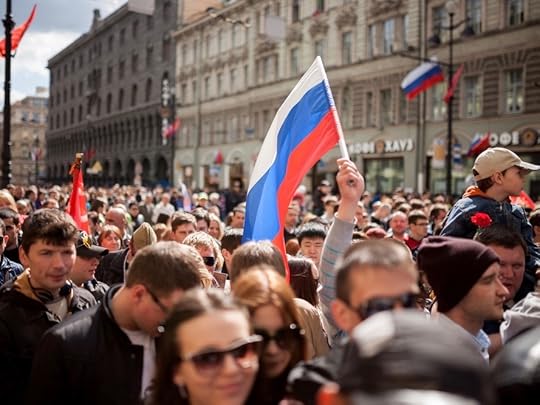 Europe and Central AsiaRussiaUkraineVladimir Putin
Europe and Central AsiaRussiaUkraineVladimir Putin
December 9, 2015
Putin vs. ISIS: Which Threatens the West More?

President Vladimir Putin’s December 3rd address to the Federation Council, the upper house of Russia’s national legislature, was an exercise in chutzpah, trying to present Russia as a victim of barbarism and a defender of peace:
Russia has long since been on the front lines of the struggle against terrorism. It’s a struggle for freedom, truth, and justice. For the lives of people and the future of our civilization.
Disregard the fact that Putin’s Russia has been on the front lines of promoting terrorism, at home and in Ukraine. Disregard the fact that Putin’s regime is the antithesis of freedom, truth, and justice. And disregard the fact that Putin has declared war on civilized norms of international behavior.
Consider only Putin’s offer of an anti-ISIS alliance with the West. As Western policymakers consider such a possibility, they would do well to first ask just who the greater threat to world peace is—the Islamic State or Putin’s Russia? The question is of fundamental importance. While no one would dispute the utility of coordinating the Western assault on ISIS with Russia’s, an anti-terrorist alliance with Russia presupposes that ISIS poses a greater threat to the West and its interests than Russia.
Although the barbarism of ISIS inclines us to believe that the Islamists are a greater threat than the Putinists, that conclusion would be a mistake. In fact, Putin’s Russia is a greater threat to the West—both because Putin’s ruthlessness borders on barbarism and because he has the will, capacity, and desire to undermine the international order that made the West possible.
Start with barbarism. Although ISIS’s cruelty is extreme and its destructiveness is wanton, they barely exceed those of Putin’s Russia. During Putin’s campaign to exterminate Chechen separatists, Russian bombs leveled Chechnya’s capital city, Grozny, while Russian soldiers killed many thousands of innocent civilians. In 1999, three Russian apartment buildings were blown to bits, and all the evidence points to the Russian secret police, of which Putin was then head, as the perpetrator. Since mid-2014, some 8,000 Ukrainians and Russians have lost their lives in Putin’s war against Ukraine. Russian troops do not behead their prisoners, as does ISIS, but Russia’s proxies have executed Ukrainian prisoners of war in the Russian-occupied Donbas. ISIS boasts of destroying a Russian plane, while Putin still denies any complicity whatsoever in the downing of Malaysia Airlines Flight 17 on July 17, 2014. Indifference to civilian casualties has also characterized Russia’s ongoing bombing campaign in Syria.
Dead Parisians may shock us more than dead Chechens, dead Russians, or dead Ukrainians, but if human lives are equally valuable, then Putin has surely destroyed his fair share.
But barbarism is not the issue. Barbarism shocks and terrifies us, but it does not threaten international peace. What does? Above all, rogue states like Russia—and not radical movements like ISIS.
Despite its name, ISIS is not yet a genuine state with all the functioning government institutions that comprise a bona fide state. It’s a revolutionary movement that hopes to construct a state. Thus far, its record of state-building has been mixed. It has seized some territory in Syria and Iraq, but its ability to administer the population is uncertain, and its prospects for continued control are even worse. Revolutionary movements can and do defeat their opponents and establish stable state institutions, but only if they have the military capacity and economic wherewithal to do so. In taking on Turkey, Iraq, Iran, Syria, Saudi Arabia, the United States, France, Russia, and many other states, ISIS is almost sure to lose on the battlefield or, at a minimum, surrender much territory. It may survive in the underground and wreak terror throughout the world, but terror, however atrocious, does not, and cannot, threaten world peace. Dead civilians are a tragedy and a crime, but they do not undermine the international order or entail inter-state war.
In contrast to ISIS, Putin’s Russia is a state—and a rogue state, to boot. It violates treaties and borders, rejects international norms, and sees war as a legitimate means to its great-power ends. Russia tore up the 1994 Budapest Memorandum that guaranteed Ukraine’s territorial integrity and unilaterally revised the borders of Georgia and Ukraine by means of armed force. Putin’s Russia views the sovereignty and airspace of its neighbors—from Estonia to Belarus to Armenia to Kazakhstan to Turkey—as anything but inviolate, while insisting that it is perfectly entitled to pursue its imperial interests by means of force.
Russia’s hitherto lackadaisical bombing of ISIS may make it a temporary, tactical, short-term partner of the West, but Putin’s established hostility to the post–World War II international system that produced the European Union and consolidated peace in Europe precludes Russia’s becoming an ally of the West.
Both Putin and ISIS reject the West and everything it stands for. But only Putin has the ability to destroy the West—by progressively undermining the international system that made a peaceful and prosperous West possible. Tactical cooperation with Russia in Syria may therefore be attractive, but it cannot distract from Putin’s strategic hostility to the West.
Should the West cooperate with Putin to destroy ISIS? Of course. But the West must remember that Putin’s Russia remains an adversary committed to the West’s demise. Its support of Ukraine and of sanctions must therefore remain unchanged. Its commitment to NATO must remain firm. And its opposition to Putin’s expansionist designs must be unequivocal.
OG Image: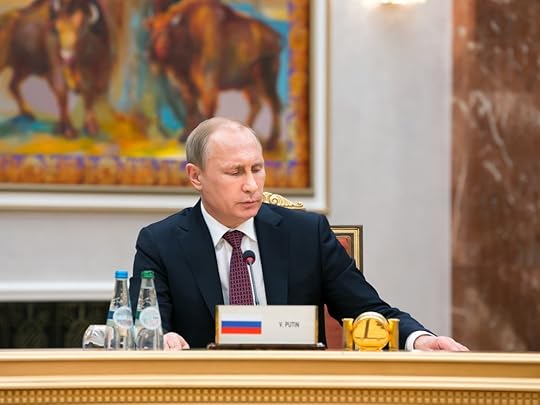 Europe and Central AsiaRussiaVladimir PutinISIS
Europe and Central AsiaRussiaVladimir PutinISIS
December 1, 2015
Interpreting Gorbachev's Very Mixed Signals

Former Soviet President Mikhail Gorbachev’s response to Turkey’s downing of a Russian fighter plane on November 24th nicely reveals the contradictions on which so much of contemporary Russian political thinking is based.
Gorbachev starts by endorsing Vladimir Putin’s hard-line response—recall that the Russian president called Turkey’s action a “stab in the back”—as “understandable” and “justified.” That’s not surprising, as Gorbachev also believes that America’s desire for “dominance” produced Russia’s war with Ukraine. Back on January 31, 2015, Gorbachev said:
Plainly speaking, the US has already dragged us into a new Cold War, trying to openly implement its idea of triumphalism. What’s next? Unfortunately, I cannot be sure that the Cold War will not bring about a “hot” one. I’m afraid [the United States] might take the risk…. All we hear from the US and the EU now is sanctions against Russia. Are they completely out of their minds? The US has been totally “lost in the jungle” and is dragging us there as well.
Clearly, the architect of perestroika and the man who brought about the USSR’s collapse—which Putin still believes was the “greatest tragedy of the 20th century”—is an out-and-out Putinist.
As such, he should support Putin’s line on Ukraine as much as he supports it on Turkey and Russia. Instead, Gorbachev makes a suggestion that either completely undermines Russian foreign policy or reveals some deep-seated logical incoherence. His response to the jet’s downing continues with the following:
I suggest immediately starting preparations for an anti-terrorist pact or convention. Of what should it consist? Above all, a ban on supplies of weapons to all illegal armed formations wherever they might be. And second: the renunciation of support—not only material, but also moral and propagandistic—of all forces and movements whose goal is armed warfare against any state or government.
Come again, Mister Gorbachev? The pact you suggest and the language you employ would prohibit Russia’s supply of weapons and propaganda on behalf of the self-styled Donetsk and Luhansk People’s Republics, “whose goal is armed warfare against” the Ukrainian “state or government.”
Has Gorbachev joined the Ukrainian “fascists” ruling Kyiv? Is he cleverly using Putinist language and logic to undermine Putinist policy? Or is he just being as incoherent as Putin?
The evidence is mixed. On March 20, 2015, Gorbachev made the following sober comments on the Russo-Ukrainian war:
There is no military solution to this conflict and there will be no winners in it. It is important to support any constructive steps and any manifestations of a more responsible approach that could lead to peace…. Attempts to isolate Russia or ignore it would always be unsuccessful. I am sure that our country will overcome the current period of economic difficulties. But we need to seriously analyze the reasons behind them.
These aren’t exactly the sentiments of a crazed Russian nationalist à la Vladimir Zhirinovsky.
On the other hand, that same article blames the war on “the deliberate failure of perestroika” and the “irresponsible” decision by the presidents of Russia, Ukraine, and Belarus to dissolve the USSR in late 1991.
These are the exact sentiments of a crazed Russian imperialist à la Vladimir Putin.
Perhaps the best way to interpret Gorbachev’s incoherence is in terms of Putinist Russia’s incoherence. On the one hand, Putin wants to make Russia great again. On the other, he’s done nothing but weaken it in the last two years, reducing it to a blustering rogue state that’s trapped in its own contradictions and has no clue about what to do. Like Mikhail Gorbachev.
OG Image: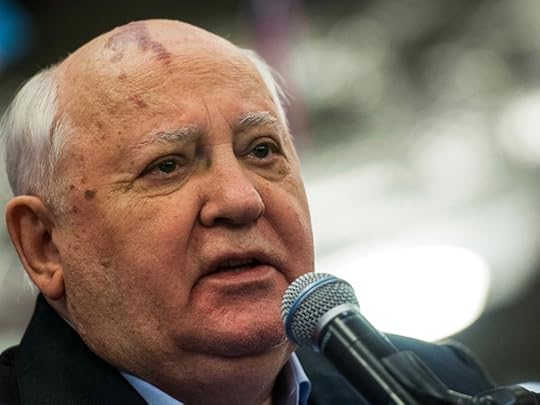 Europe and Central AsiaRussiaUkraineMikhail GorbachevVladimir Putin
Europe and Central AsiaRussiaUkraineMikhail GorbachevVladimir Putin
November 20, 2015
A Frenchman Comes to Ukraine

Meet one of Ukraine’s most determined pro-Western politicians and Ukrainian patriots. He’s the mayor of Hlukhiv, a small city located northeast of Kyiv, in Sumy Province, just a few miles from the border with Russia.
His name is Michel Terestchenko.
Until March 2015, the 61-year-old Terestchenko was a French citizen, born and raised in Paris. That month he acquired a Ukrainian passport straight from the hands of President Petro Poroshenko. Why the hullabaloo? Because Terestchenko is a descendant of the Tereshchenko family, one of Ukraine’s grandest, having produced a number of prominent entrepreneurs, philanthropists, art collectors, and diplomats in the 18th–20th centuries. The family fled to France during the bloody years of the Bolshevik Revolution. Their expropriated art collection then formed the core of what eventually became the Kyiv National Museum of Russian Art.
Michel—described by one source as an “art patron, entrepreneur and descendant of the legendary dynasty” and by another as a “cordial bon vivant clad in a brown bomber jacket”—returned to Ukraine about a decade ago. Apparently, “a sudden desire to see his ancestral home nearly a decade ago moved Tereshchenko to resettle from Paris and turn part of the old family mansion into the office of a profitable flax and hemp production plant.”
Terestchenko’s decision to get involved in politics was just as unexpected. He speaks Russian slowly, slightly ungrammatically, and with a charming French accent:
I love Ukraine very much. It’s the homeland of my ancestors. It’s now my homeland. I was on the Maidan. I was no hero, just a simple man. I was still French then…. I was there all the time. I saw how they brought down the Lenin monument on December 8 [2013]…. I saw fourteen corpses. I will never forget this. Until then, I believed it was possible not to take part in politics. But then I saw what had happened…. Things are difficult at the state level. There are reforms, but they’re proceeding very slowly… Many people have died, over 7,000. Every family has experienced a trauma. And in Hlukhiv there are no reforms… The city is dying…. There are no investments, no future…. When the residents of Hlukhiv suggested I run for mayor, I said to myself: Michel, you can’t say no.
In the October 25th local elections, Terestchenko trounced his opponent, winning two-thirds of the vote.
He has no illusions about the size of the task before him. But he remains optimistic:
Tereshchenko told Agence France Presse that he hoped to establish a flourishing, corruption-free democratic government like the one his grandfather had hoped to establish in Tsarist Russia. “It failed in Russia. But it will succeed in Ukraine,” he said.
Terestchenko’s victory is important for several reasons. First, it demonstrates that anti-system candidates are able to win office in the post-Maidan Ukraine. Just these individuals will be able to parlay the greater authority and resources that Ukraine’s soon-to-be-implemented decentralization grants them into more effective local government. Terestchenko actually could succeed in fixing Hlukhiv.
Second, Terestchenko’s deeply rooted Ukrainian patriotism gives the lie (yet again) to Russian and Western pro-Russian propaganda that insists the Euromaidan Revolution was the handiwork of fascists and Nazis and that Kyiv is in the hands of a vicious junta. The Nation magazine might want to take note.
Third, Terestchenko’s election and acceptance by the local population suggests that Ukrainians may not be the xenophobes that the Russian right and the Western left says they are. More important, the emergence of a Russian-speaking, French-born Ukrainian as a prominent local political figure suggests that a new post-Maidan Ukrainian identity is indeed in the process of formation.
Fourth, the Terestchenko phenomenon would have been impossible without the Euromaidan Revolution, showing once again that this overwhelmingly impressive demonstration of “people power” has already had and will continue to have enormous positive consequences for Ukrainian politics and culture.
Small wonder that Vladimir Putin hates and fears Ukraine. If, as Terestchenko hopes, free democratic government “will succeed in Ukraine,” Russia could be next.
OG Image: Europe and Central AsiaUkraineMichel TerestchenkoEuromaiden
Europe and Central AsiaUkraineMichel TerestchenkoEuromaiden
November 11, 2015
Promising Structural Change Begins to Show in Ukraine
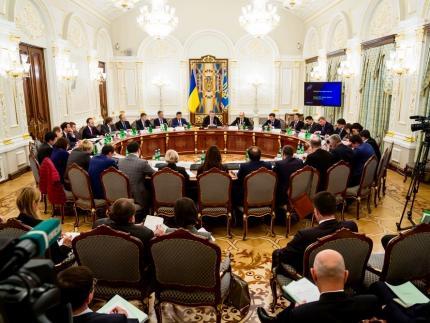
The seemingly unchanging nature of Ukraine’s dysfunctional politics can easily mask the reality: Ukraine itself is changing. Three sets of data illustrate the point.
The Ukrainian Week recently published numbers on the changes in Ukraine’s ethnic composition brought about by general demographic trends and, above all, Russia’s annexation of the Crimea and occupation of one third of the Donbas. According to the magazine’s demographic extrapolations from the 2001 census, the number of ethnic Russians in Ukraine has fallen from 8.34 million to 4.58 million—a 45 percent decrease. Ethnic Russians used to constitute 21.1 percent of Ukraine’s total population; now, they constitute 11.8 percent. In contrast, the ethnic Ukrainian share of the total population has grown from 72.7 percent in 1989 to 83.8 percent today.
In effect, if not in intent, Vladimir Putin’s aggression has transformed Ukraine into an ethnically Ukrainian state. Russia’s war against Ukraine has also imbued those Ukrainians with a sense of identity and patriotism that they failed to develop on their own. Both trends are likely to be mutually reinforcing in the years ahead—which bodes well for Ukraine’s nation and state building efforts as well as for its ability to sustain painful reforms. As many social scientists argue, culturally solidary communities are more prone to agree and to sacrifice than culturally fragmented communities.
Less optimistic is Ukraine’s overall demographic condition. As demographers Anatole Romaniuk and Oleksandr Gladun argue in Population and Development Review (June 2015):
Ukraine experienced, during the first half of the twentieth century, a series of demographic catastrophes almost unparalleled in history. It withstood these largely thanks to high fertility. It now imposes a demographic crisis on itself. Even with fertility having recovered from its lowest point and emigration having slowed, it is difficult to foresee a future in which Ukraine’s population does not continue to decline—age structure alone will see to that—albeit at a more moderate pace…. There are three possible responses to ameliorate the trend: reduce the hemorrhage of young people leaving the country, increase fertility, or improve health, especially male health.
Note that all three responses identified by Romaniuk and Gladun presuppose a prosperous economy, one that will offer young people opportunities, enable couples to envision a future for their children, and improve health facilities. And a prosperous economy, needless to say, presupposes painful economic reforms.
Kyiv’s reforms have been sluggish, but there may be more going on than meets the eye. That at least is what the indispensable website VoxUkraine suggests in a recent article measuring the degree of personnel change in Kyiv’s state bureaucracy. The results are heartening:
The Central Apparatus of the Central Executive Authorities has been downsized, but the change is minor. Average reduction for the period from the beginning of 2014 till mid 2015 is 5 percent.
At the ministry level, the picture is more nuanced and heterogeneous. Some authorities have cut the number of employees: Ministry of Economic Development and Trade—34 percent, Ministry of Social Policy—15 percent, State Property Fund—13 percent, Anti-Monopoly Committee, Ministry of Infrastructure, Ministry of Finance, Ministry of Agrarian Policy—11 percent, Ministry of Ecology—8 percent, Ministry of Regional Development and Trade—3 percent, Ministry of Culture—2 percent.
Others have increased the number of employees of their central offices from the beginning of 2014 till mid 2015: e.g. NBU [National Bank of Ukraine] increased for 3 percent, Ministry of Justice for 12 percent, Prosecutor General Office for 11 percent, and Ministry of Youth and Sports for 15 percent.
Some Authorities have substantively reduced their regional units. The leaders are law enforcement authorities and the central bank. The Ministry of Internal Affairs has cut 14 percent of local people, the Ministry of Justice and Prosecutor General Offices reduced their sizes for 22 percent, the central bank—21 percent.
The renewal rate among the top levels of the government (ministers, deputies, heads of departments) is about 80 percent, benchmarked to the beginning of 2014. The management of the State Fiscal Service and the Prosecutor General Office are renewed at 91 percent.
The renewal rate drops dramatically for lower levels of the hierarchy in the government.
In other words, the bureaucracy is getting streamlined, though not evenly, and outsiders are increasingly getting positions of authority. The current Poroshenko-Yatseniuk government may be indifferent to rooting out corruption and introducing radical reform, but the proverbial facts on the ground may be making systemic change inevitable.
OG Image: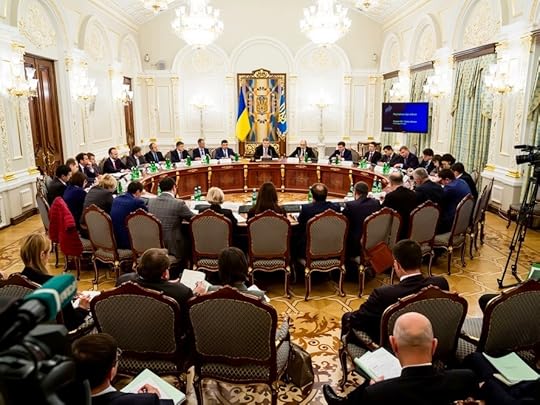 Europe and Central AsiaUkraineRussia
Europe and Central AsiaUkraineRussia
November 10, 2015
Morality, Pragmatism, and Orwell in Rhetoric and Policy
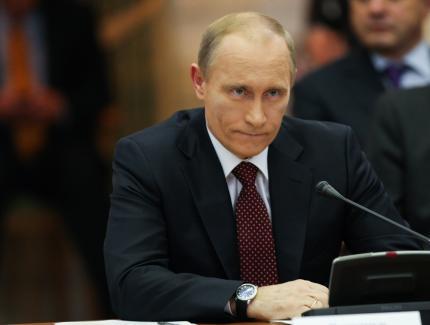
We’ve all gotten very familiar with Vladimir Putin’s Orwellian logic, according to which peace is war, intervention is non-intervention, democracy is fascism, and fascism is democracy. His latest comments at the Valdai discussion club just reinforced, if any reinforcing were still necessary, the point that the man is a master of mendacity.
We generally don’t expect equally bizarre ethical or logical standards from Western commentators. And yet they do occur, especially with regard to Putin, Russia, and their war in Ukraine.
On October 20th, Professor Mark Galeotti of New York University argued that the “West has lost the right to lecture Putin.” According to Galeotti:
This is not simple “whataboutism,” that classic trick of deflecting criticism through raising the other side’s real or alleged flaws. Rather it is to note that Washington is currently seeking to have its cake and eat it. It can choose to base its foreign policy on strict moral principles or geopolitical pragmatism.
At present, it seems happy to act pragmatically but think morally. Thus it genuinely considers Putin not simply an antagonist, but an immoral one.
This is dangerous and foolish…. Castigating [Putin’s Russia] on moral grounds, without behaving in an unimpeachably moral way, is simply going to alienate Moscow, undermine Western credibility, and create a wholly false series of assumptions on which to base policy.
The uncomfortable truth is that in Syria, as in so many other ways, Putin is simply ruthlessly exploiting and expanding precedents already set by the West.
Galeotti’s suggestion that the choice before policymakers is either “strict moral principles” or “geopolitical pragmatism” is absurd. The fact is that Western democracies do indeed attempt to combine both principles; they do not just “act pragmatically but think morally.” True, Western democracies as often fail to combine both principles as they succeed. But 100 percent success is not the point. Instead, the point is to try to be both pragmatic and moral—no easy task.
In this respect, Western democracies differ fundamentally from authoritarian dictatorships, fascist states, and autocracies such as Putin’s Russia. Putin makes no effort whatsoever to combine morality with pragmatism. Indeed, he twists morality as need be in order to pursue his ends. A guilty conscience is thus impossible in Putin’s warped moral universe, while guilty consciences are built into the very fabric of Western thought. When the West criticizes others for their misdeeds, it effectively criticizes itself. Although the West is frequently hypocritical, its hypocrisy is testimony to the fact that it does have ethical standards, even, or especially when, it violates them. As a result, the West doesn’t just have the right to criticize Putin: It has the obligation to do so.
Take Galeotti’s argument to its logical conclusion, and you’d have to claim that no one but a saint should dare to express ethical reservations about anything or anybody.
Even more bizarre standards are found in a commentary by Bloomberg columnist Leonid Bershidsky, who believes that the recently released “MH17 crash report shows no side was innocent.” According to Bershidsky, while it’s true that “the Buk missile that destroyed the plane must have been launched from rebel-held territory,” Ukraine “failed in its duty by allowing passenger jets to fly over the conflict area.” To be sure, says Bershidsky, “while there can be no moral equivalency between arming or protecting the perpetrators of that crime, and failing to close the skies, the uncomfortable truth laid bare by the report is that both sides in the conflict were glaringly incompetent.”
Come again? The rebels or the Russians commit a heinous crime by deliberately shooting down a plane, and that’s mere incompetence? Even if they believed it was a military plane—which may be unlikely, given the high altitude at which MH17 was flying—the fact is that they deliberately decided to shoot it down. Meanwhile, the Ukrainians fail to imagine that the rebels or Russians would actually shoot down passenger planes and they, too, are as incompetent as the rebels or Russians who actually commit the crime?
Competence or incompetence is not the issue here, just as it is not the issue in any crime. The only relevant questions are: Was a crime committed and who committed it? And the answers to both questions are: Yes, a crime was committed because a plane was deliberately shot down, and the Russians or their proxies fired the missile that destroyed the plane.
Bershidsky doesn’t take his argument far enough. Logically, he should also accuse the pilot of MH17 and its passengers of being equally incompetent and hence indirectly complicit. After all, who but an incompetent would decide to fly over a war zone? Who but an incompetent would fail to determine beforehand whether the plane would be flying over contested territory?
The questions are as obscene as the moral standards of Putin and his apologists.
OG Image: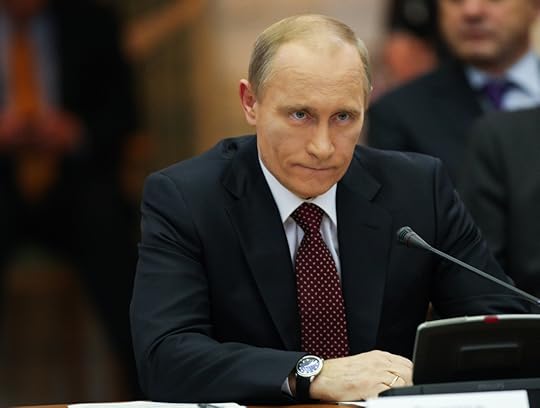 Europe and Central AsiaNorth AmericaRussiaEuropeUkraineVladimir Putin
Europe and Central AsiaNorth AmericaRussiaEuropeUkraineVladimir Putin
October 16, 2015
A Cautionary Note: Reintegrating the Donbas
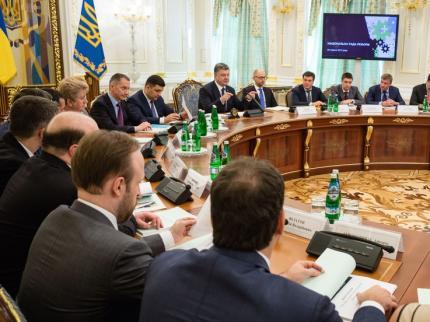
The fighting in the Donbas may be winding down, but Ukraine’s war with Russia will continue as long as Vladimir Putin believes that Ukraine must become his subject.
Now more than ever Ukraine’s survival as a democratic Western state depends on the continued strengthening of Ukraine’s military capability and the acceleration of reform.
An ostensibly peaceful Russia wedded to imperial expansion is no less of a military threat to Ukraine than an openly hostile Russia wedded to imperial expansion. The West is too preoccupied with its own problems and too indifferent to Putin’s destruction of the post-war international order to save Ukraine.
Only Ukraine can protect itself from further Russian predations by acquiring a first-class military able to deter all but the craziest of Russian leaders. Meanwhile, a first-class military is impossible without a strong economy, which in turn is impossible without serious, sustained reform.
As difficult as introducing reform has been, it’s about to get much harder—for two reasons.
First, the seeming end to fighting will incline some Ukrainian policymakers to conclude that the Russian threat has waned and that they can relax.
Second, it now looks like Ukraine may actually have to reintegrate the Donbas enclave sometime in the near future. I’ve been arguing ad nauseam that Ukraine would be infinitely better off by keeping the enclave on the other side of a high wall. Alas, my argument may be about to become moot, as—or if—Minsk-2 is implemented.
Signed in February 2015, the Minsk-2 accords propose a series of steps—a cease-fire, an exchange of prisoners, a constitutional amendment regarding the Donbas enclave’s status, Russian withdrawal, local elections, and Ukrainian control of the enclave’s border with Russia—that are supposed to end the war and usher in peace. The problem with the deal is that Ukraine expects Minsk-2 to lead to its reassertion of sovereignty, that Russia expects it to produce Ukrainian subservience, and that the separatists expect it to reinforce their rule.
It’s therefore perfectly possible that Minsk-2 will break down, as all sides realize there is no way to finesse their incompatible demands. The result could be a frozen conflict, with the added advantage that Russia might be reluctant to renew hostilities and incur sanctions. Were that to happen, Kyiv should formally declare that the Donbas enclave is occupied territory that falls under the purview of the occupying power, Russia.
If Putin’s proxies are less strategically daft than he is, they might push for reintegration and thereby put Ukraine in the hot seat. As absolutely everyone knows, the enclave—and indeed the whole Donbas, even the part occupied by Ukrainian forces—has been and still is ruled by criminal clans, criminal oligarchs, criminal mafias, and—the latest twist—criminal separatists and criminal warlords. Most of the population is unremittingly hostile to everything the new Ukraine stands for. The economy is in ruins.
If anyone knows how Ukraine is supposed to reintegrate this cancerous region without infecting itself in the process, please tell me.
The challenge would be enormous even if Ukraine defeated the Russian separatists and occupied the territory. And Ukraine has not defeated the rebels. Nor will it ever occupy the enclave and impose its will without reigniting the war.
Instead, Ukraine will have to reintegrate an unreconstructed and unreconstructable region. That’s what Minsk-2 mandates. And that’s been the declared goal of the Ukrainian political establishment.
As they say, be careful what you wish for. It may come true.
There’s only one way for a potentially reintegrated Donbas enclave to wreak minimal damage on Ukraine.
Kyiv should quarantine the territory and its thugs by giving it, and them, almost complete sovereignty within a confederal relationship with Ukraine.
Neither Kyiv nor the enclave would interfere in each other’s internal or external political affairs. Both sides would pursue their own economic policies, refrain from subsidizing each other, keep all the taxes they collect, and pursue trade with whomever they desire. Each side would be responsible for law and order, speak whichever language it desires, remember what it wants to remember, and honor whomever it wants to honor. Other issues would be stickier (Would there be one army or two? Would the enclave pursue its own foreign policy? Would there be one president or two?), but not immune to creative solutions.
Russia and its separatist thugs—along with France, Germany, and the United States—would be hard-pressed to say nyet to such a deal, while Kyiv and Ukraine’s hotheads could claim victory and declare that Ukraine is whole again.
Do confederations work in the medium to long term? Rarely, unless, as in the case of the Swiss, there are special circumstances that overcome the centrifugal forces built into them.
If the Ukrainian confederation works, great. Ukraine proper will reform, while the enclave goes to the hell of its choice. If the confederation doesn’t work and both sides agree to go their own way—perhaps like the Czechs and the Slovaks—what’s not to like?
OG Image: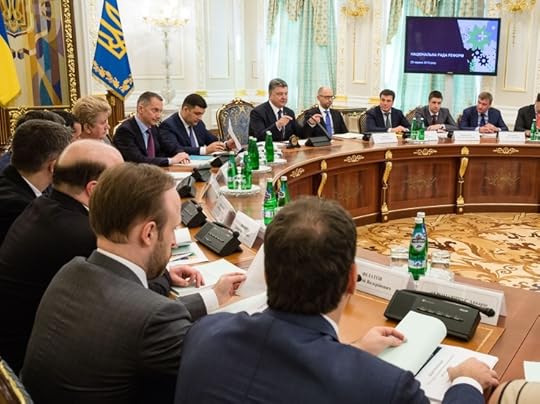 Europe and Central AsiaDonbasUkraineRussiaDonbas
Europe and Central AsiaDonbasUkraineRussiaDonbas
October 5, 2015
At the UN, Poroshenko 1, Putin 0
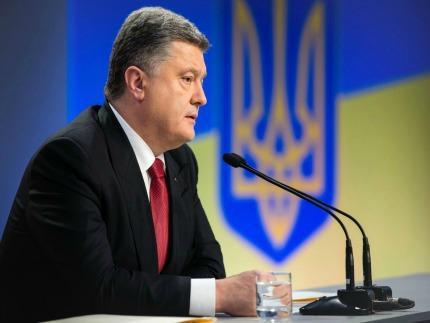
Not that speeches delivered at the United Nations General Assembly matter, but, if they did, Vladimir Putin’s would have garnered him a failing grade, while Petro Poroshenko’s would have been in the A range.
Putin said his usual bromides about the importance of the UN and international institutions, conveniently forgetting his violation of the 1994 Budapest Memorandum and the 1978 Helsinki Accords. He praised state sovereignty, while ignoring his invasions of Georgia and Ukraine and occupation of eastern Moldova. He condemned terrorism, while promoting it in Ukraine. It takes real chutzpah to make the following claims:
Russia stands ready to work together with its partners on the basis of full consensus, but we consider the attempts to undermine the legitimacy of the United Nations as extremely dangerous. They could lead to a collapse of the entire architecture of international organizations, and then indeed there would be no other rules left but the rule of force.
We would get a world dominated by selfishness rather than collective work, a world increasingly characterized by dictate rather than equality. There would be less of a chain of democracy and freedom, and that would be a world where true independent states would be replaced by an ever-growing number of de facto protectorates and externally controlled territories.
Russia has always been consistently fighting against terrorism in all its forms. Today, we provide military and technical assistance both to Iraq and Syria and many other countries of the region who are fighting terrorist groups.
Then, after excoriating the West for causing instability in Syria and Ukraine, Putin actually has the gall to propose the formation of an international anti-terrorist coalition. Fat chance. Somebody should have told Vlad that you don’t make friends by creating de facto protectorates and supporting terrorist regimes in eastern Donbas and Syria, claiming innocence, and hoping to create a coalition with the very people you detest.
Naturally, Putin knew that his speech would fall on deaf ears. The dictator of an imperialist state has no interest in international cooperation. But his megalomania requires that he preach to the converted: Russians back home and his fellow travelers abroad.
Unsurprisingly, the speech was vapid. The world expected Putin to announce some major initiative. He didn’t. Instead, he looked like a blustery whiner and a sore loser who just doesn’t get the rules of the game.
Contrast his performance with Poroshenko’s. The Ukrainian president took Putin head on and refused to mince words:
How can you urge an anti-terrorist coalition, if you inspire terrorism right in front of your door?
How can you talk about peace and legitimacy, if your policy is war via puppet governments?
How can you speak of freedom for nations, if you punish your neighbor for his choice?
How can you demand respect for all, if you don’t have respect for anyone?
The Gospel of John teaches us: “In the beginning was the word.”
But what kind of a gospel do you bring to the world, if all your words are double-tongued like that?
The anaphora was a nice rhetorical touch. Poroshenko came across looking like the strong and self-confident ruler of a country with a future. And he brought home the fact that “double-tongued” Putin is a liar who cannot, ever, be trusted.
Poroshenko implied much more: that Putin is also a criminal who promotes terrorism, kills innocents, and violates moral and legal codes.
And Poroshenko is right, of course.
OG Image: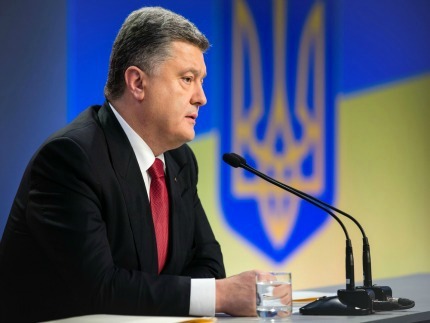 Europe and Central AsiaRussiaUNGeorgiaUkraineMoldovaUnited NationsPoroshenkoVladimir PutinUNPetro Poroshenko
Europe and Central AsiaRussiaUNGeorgiaUkraineMoldovaUnited NationsPoroshenkoVladimir PutinUNPetro Poroshenko
September 25, 2015
Putin’s Misguided Move in Syria

Russia’s incompetent bully of a leader, Vladimir Putin, has just committed his latest blunder. He’s decided to prop up the dying Assad regime with weapons and soldiers. Good luck! The USSR’s fiasco in Afghanistan and America’s in Iraq have clearly failed to deter the Kremlin’s serial bumbler from committing his latest strategic mistake.
The mortar shell that struck Russia’s embassy compound in Damascus on September 20th is a foretaste of things to come. As Russian troops intervene in greater numbers—as they surely will in order to prop up a doomed regime—Russian casualties will mount. Eventually, ISIS will engage in its usual barbarism and beheaded Russian soldiers will appear on television. At that point, Western commentators, who’ve mostly interpreted Putin’s intervention as a devilishly clever move, will start saying that Russia stumbled into a conflict it cannot win.
Putin watchers shouldn’t be surprised by the Russian dictator’s latest blunder.
His mistakes started with his unwillingness to use the enormous windfall from rising energy prices to modernize the Russian economy. Instead of building an open society, Putin constructed a “fascistoid” political system and kept Russia as a petro-state. That Russia’s economy is now contracting as a result of falling energy prices is Putin’s fault. So is the fact that educated professionals and money are leaving the country in droves.
Putin stupidly supported Ukrainian President Viktor Yanukovych in 2004, thereby accelerating that country’s drift toward the West. Even more stupidly, he opposed Ukraine’s Association Agreement with the European Union in late 2013, thereby sparking the Euromaidan Revolution that led to Yanukovych’s flight. Putin then invaded the Crimea and the Donbas—provinces that he already controlled—thereby turning Ukraine against Russia, destroying the occupied regions’ economies, and saddling Russia with the bill. All this, while sanctions accelerated Russia’s economic decline, smothered foreign investment, and increased capital flight.
Meanwhile, Russia’s violation of the postwar security order in Europe galvanized a demoralized NATO, turned the United States and Europe against Russia, led to traditionally Russophile Germany’s adoption of an anti-Russian stance, forced Putin to grovel before an indifferent China, and transformed Russia into a rogue state whose closest ally now appears to be mighty North Korea.
Russians used to joke that Mikhail Gorbachev’s perestroika was a CIA plot to destroy the Soviet Union. I’m beginning to think Vlad Putin is a sleeper agent of the Company. A few more years of his bumbling, and the Russian state may become history.
The bottom line is that Russia’s security and strength are significantly worse off today than they were two years ago. And Putin, whom Russians adore, is to blame.
To top it off, Putin has decided to jump from the frying pan into the fire by intervening in Syria.
Not just with weapons, but with actual troops. The Assad regime is either doomed, or it can be saved only with massive outside intervention. Wisely, neither the West nor the Arab states want to send in troops. Russia will have to, increasingly. Will Russia be able to defeat ISIS? Probably not. Even if it does, the price it’ll pay in lives and money will be high. You’d think that Putin might have learned from the USSR’s misadventure in Afghanistan and America’s in Iraq. Evidently not—which is exactly what you’d expect from a paranoid, narcissistic, solipsistic fascist leader who doesn’t understand that a declining economy is a brake on foreign interventions.
Meanwhile, ISIS isn’t Putin’s only problem. The National Coalition of Syrian Revolution and Opposition Forces condemned Russia on September 12th:
With this aggressive move, Russia has moved from a stage of supporting a criminal regime that carries out genocide in our country to a stage of direct military intervention alongside a crumbling illegitimate regime. The direct Russian military intervention places the Russian leadership in a position of hostility towards the Syrian people, and makes its forces on Syrian soil occupation forces... We present these facts to the international community, to the UN, to the Arab League, and especially to the Russian people—we do not wish upon them in Syria a repeat of their experience in Afghanistan—because Syrians will not remain silent over the occupation of their land and the spilling of their sons’ blood.
Putin’s Syrian idiocy makes Ukraine the big winner. Having effectively abandoned his proxies in the Donbas, Putin has made a frozen conflict there almost inevitable. The terrorists, thugs, and mercenaries misruling the Russian-occupied Donbas enclave won’t agree to reintegrate into Ukraine on Kyiv’s terms, and Kyiv can’t agree to reintegrate them on theirs. The resulting stalemate will keep the Donbas hellhole out of Ukraine, force Russia to keep paying millions to sustain it, and free Ukraine to focus on internal reforms and external Westernization.
Russians are the big losers. They will have to pay with their lives for Putin’s megalomania and their own moral blindness.
Also in the running are Western realist scholars.
They’ve been arguing that Russia attacked Ukraine because of some mythical NATO plot to incorporate it. Wrong: NATO was a paper tiger and, while Kyiv did not seriously pursue Ukraine’s membership until after Russia invaded, NATO has remained skittish about the prospect even today.
They’ve also been arguing that Ukraine is an existential interest of Russia, and that Moscow would defend it to the finish. Wrong again: No rational leader abandons an existential interest to engage in crazy overseas adventures.
Finally, they’ve been arguing that Putin is a rational ruler who wants to maximize Russia’s power and security. Wrong, wrong, wrong: Putin is rational only if rationality is tantamount to paranoia, hyper-nationalism, imperialism, and supremacism.
OG Image: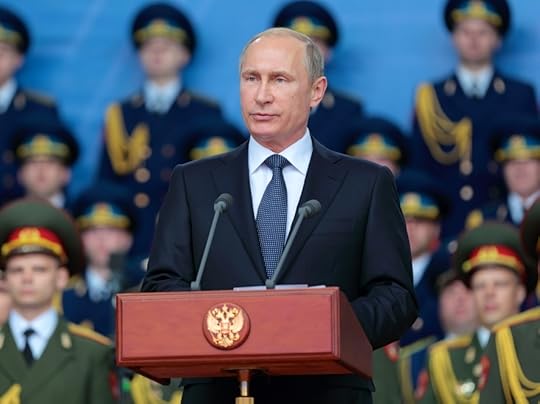 Europe and Central AsiaRussiaSyriaVladimir PutinSyria
Europe and Central AsiaRussiaSyriaVladimir PutinSyria
September 22, 2015
The Fool, Russia, and Ukraine

With The Fool (Durak), 34-year-old Russian film director Yuri Bykov has officially become his country’s Cassandra.
The New York Times says the film is about corruption in a squalid Russia. Bykov’s 2014 film is about much more than that. The Fool is an obvious allegory of the rottenness—and coming collapse—of Vladimir Putin’s Russia.
Dima Nikitin, a plumber, notices that a building occupied by the dregs of society in his hometown has a large crack running from top to bottom and concludes that, since the foundation is shifting and the building is tilting some 10 percent, its collapse is inevitable. He tries to mobilize the city mayor and her council to take action. At first determined to do something, they realize that their theft of state funds has depleted the treasury and made evacuating the building impossible. Besides, there’s no place to put the 800-plus inhabitants. The mayor and one of her advisers then decide to do nothing, hatching a plan to blame any later calamity on the heads of the fire and housing departments. Meanwhile, Dima decides to save the building’s inhabitants on his own. He runs from apartment to apartment shouting that the “building is collapsing.” Once everyone leaves, and the building fails to fall, the people turn on him. The last scene shows him lying in the snow, unconscious or dead.
Needless to say, the building stands for Putin’s Russia. Everybody is on the take—from the people who live in the building to the mayor and her chums to the governor who gets a 50 percent kickback from the city budget. The police chief says, “I’m Russian. How can I not take bribes?” However, Bykov’s central concern is not corruption per se, but its destructive impact on Russia—on the building. “Leave,” Dima’s father tells him, “this place will never change. Never.” Dima tells his wife that “we live and die as swine, because we treat one another as nothing.” The mayor asks Dima when the building will collapse. “It’s already falling,” he replies.
Just like Putin’s regime.
The film reminded me of Andrei Zvyagintsev’s Leviathan, also released in 2014, which depicts one man’s hopeless battle against corrupt city officials in Russia’s North. Not only does he lose. He also loses his wife and best friend and is thrown into jail, to boot.
More important, The Fool is very reminiscent of Little Vera, Vasili Pichul’s 1988 film that depicted the squalor and corruption of late Brezhnev Russia. Some three decades later, nothing has changed. The population lives in misery, while the elite drink champagne. Little Vera presaged the USSR’s collapse. The Fool predicts Russia’s downfall. Whether it’s the country’s or the regime’s, you can decide for yourself.
I hope The Fool gets widely distributed in Ukraine. Unfortunately, there is all too much about the film that applies with equal force to Ukraine. Viewers will have no trouble realizing that both Russia’s and Ukraine’s buildings are in trouble.
There are two key differences, however. Thanks to the Orange and Maidan Revolutions, Ukrainians know they need to fix their home fast. Russians are still in denial. Indeed, Putin seems intent on adding other decrepit buildings to his existing collection, while Russians cheer him on and turn on their Cassandra.
That may be the key difference between Ukraine and Russia. Ukraine has hope. Russia is hopeless.
OG Image: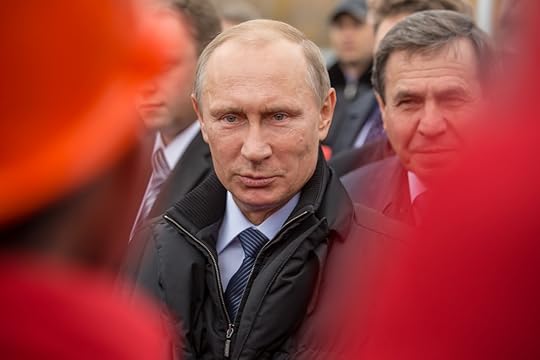 Europe and Central AsiaRussiaUkraineRussianVladimir Putin
Europe and Central AsiaRussiaUkraineRussianVladimir Putin
Alexander J. Motyl's Blog
- Alexander J. Motyl's profile
- 21 followers


